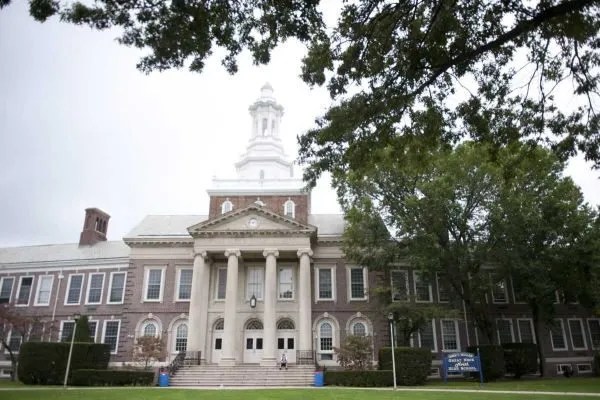The Great Neck School District responded to confusion and fears about the dismantling of the U.S. Department of Education, reassuring the community that while the district would be impacted, federal funds it receives are secured as it continues drafting its upcoming school budget.
Superintendent of Schools Kenneth Bossert provided an update on the anticipated effects of the dismantling of the federal U.S. Department of Education at the district’s board of education meeting on Tuesday, March 25.
Last week, President Donald Trump signed an executive order seeking to dismantle the department.
Bossert addressed that there are opinions both for and against this action, but that the ramifications affect the Great Neck Public Schools.
The programs that typically receive these funds are remedial reading, English language learners, summer programs, and certain staffing positions.
If federal funds decrease, Bossert said it would not lead to the cutting of the associated programs. Instead, the district would look program-wide for areas where cost savings could be made.
“What I don’t want misinterpreted by the board or the community is that if any of the funding from the federal government should cease, there are lots of people in positions of authority that think the funding will shift to the states and that we would instead receive the funding from New York rather than the federal government,” Bossert said. “We shall see.”
Bossert said the largest driver of school policies are from the state and the district’s board of trustees, not the federal government. He said the abolishment of the U.S. Department of Education would have “minimal” effects on the school district.
He said the district has been reassured that the federal funding has been secured for the “immediate future.”
Despite the anticipation of the lack of major policy effects, Bossert said they are keeping an eye on federal funding impacts. He said the district typically receives about $3.5 million in federal funds, about 1% of its budget yet not included in its general fund budget.
These federal changes come as the district is drafting its upcoming budget for the 2025-2026 school year.
Deputy Superintendent John O’Keefe presented the district’s third budget at the board of education meeting on Tuesday, March 25.
The district estimates the potential tax levy to be about $244,222,078 next school year, or a 3.05% increase. This falls within the district’s allowable tax increase and is compliant with the tax cap, O’Keefe said.
While the state sets the tax cap at a 2% increase, this is only for one portion of the formula, O’Keefe said. This permits school districts to increase their taxes by more than 2% yet still comply with state law.
The district has not disclosed the full budget amount yet.
On Tuesday night, O’Keefe presented the portion of the budget for district instruction.
About $148.6 million is allocated for instruction, an increase of nearly $4 million from the current budget. This is split among increases for special education programs, general education, instructional technology and media, the registrar’s office and guidance department, nursing and health services, clubs and interscholastic athletics.
The proposed general education budget is about $81 million, with $71 million going to teachers. The remaining $10 million is divided among other instructional employees, department heads, classroom equipment, instructional supplies, and textbooks.
Another nearly $37 million is for programs for students with disabilities, including $19 million for teachers. The remainder is for other areas, such as BOCES services, contractual services, and tuition for out-of-district placement.
The proposed budget would maintain all existing programs and courses, support programs like universal pre-K, and provide funding for arts, athletics, and extracurriculars.
The budget would also support various facility and security upgrades, including renovating the South High auditorium, installing a new hot water storage system at South High and South Middle, installing a new public announcement system at John F. Kennedy Elementary, and renovating the Village School’s bathrooms.
The district’s capital improvements would cost about $10.5 million, with $7.7 million going toward the South High auditorium project.
The district is also considering pursuing two capital reserve projects at North Middle School. One would be field improvements, including installing a synthetic field and drainage improvements, and the other would be renovating a former shop classroom into a multi-purpose room.
The projects would use $8,868,019 from the district’s capital reserves, a fund supply explicitly allocated for capital projects.
The community must vote on the expense of funds for capital projects. The board of education voted unanimously Tuesday night to place the proposition on the May 20 ballot.
The Great Neck Board of Education will host its next meeting on April 22, where it is anticipated the fourth budget presentation is given and the board will vote on whether or not to adopt it. A public hearing for the adopted budget will be held on May 12 before it faces a community vote on May 20.



































